40 montgomery bus boycott
The Bus Boycott | Explore | Rosa Parks: In Her Own Words ... "During the Montgomery bus boycott, we came together and remained unified for 381 days. It has never been done again. The Montgomery boycott became the model for human rights throughout the world." When Rosa Parks was arrested on December 1, 1955, for refusing to give up her bus seat to a white man, she was mentally prepared for the moment. Montgomery Bus Boycott Photos and Premium High Res ... 219 Montgomery Bus Boycott Premium High Res Photos Browse 219 montgomery bus boycott stock photos and images available, or search for martin luther king jr or rosa parks to find more great stock photos and pictures. of 4 NEXT
› rosa-parks-refuses-moving-busHow Rosa Parks Helped Spark the Montgomery Bus Boycott Sep 01, 2019 · The one-day boycott of the buses in Montgomery was so successful that it turned into a 381-day boycott, now called the Montgomery Bus Boycott. The Montgomery Bus Boycott ended when the Supreme Court ruled that the bus segregation laws in Alabama were unconstitutional.

Montgomery bus boycott
Montgomery Bus Boycott | National Women's History Museum When Parks was asked to move to the back, she refused, and like Colvin she was arrested. Colvin and Parks along with other early protestors sparked a yearlong boycott of the Montgomery bus system. The boycott culminated in the desegregation of public transportation in Alabama and throughout the country. Montgomery Bus Boycott Timeline - ThoughtCo The WPC launches a one-day bus boycott on December 2. Robinson also creates and distributes flyers throughout Montgomery's African-American community concerning Parks' case and a call to action: boycott the bus system of December 5. On December 5, the boycott was held and almost all members of Montgomery's African-American community participate. Montgomery Bus Boycott - Black Art Story The Montgomery Bus Boycott was a civil rights protest during which African Americans refused to ride city buses in Montgomery, Alabama, to protest segregated seating. The boycott took place from December 5, 1955, to December 20, 1956, and is regarded as the first large-scale U.S. demonstration against segregation.
Montgomery bus boycott. Montgomery Bus Boycott | The Martin Luther King, Jr ... Sparked by the arrest of Rosa Parks on 1 December 1955, the Montgomery bus boycott was a 13-month mass protest that ended with the U.S. Supreme Court ruling that segregation on public buses is unconstitutional. The Montgomery Bus Boycott - Pieces of History Parks—a middle-class, well-respected civil rights activist—was the ideal candidate. Just a few days after Parks's arrest, activists announced plans for the Montgomery Bus Boycott. The boycott, which officially began December 5, 1955, did not support just Parks but countless other African Americans who had been arrested for the same reason. The Montgomery bus boycott and the women who made it ... The boycott ended and buses were integrated on Dec. 21, 1956, after the U.S. Supreme Court ruled that Montgomery's segregation laws on buses were unconstitutional. (Associated Press photo via Wikimedia Commons) Ula Taylor: I think it's important to understand that there are different ways of being a leader. Teaching the Montgomery Bus Boycott - Civil Rights Teaching Teaching the Montgomery Bus Boycott. Students learn from pre-school through high school that Rosa Parks refused to give up her seat in Montgomery, the buses were desegregated, and the Civil Rights Movement was launched. The disconnect between Rosa Parks' arrest and the 381-day boycott creates the illusion that it was a spontaneous response to ...
› history › long-did-rosa-parksHow Long Did Rosa Parks Go to Jail For? - Reference.com Mar 26, 2020 · As the test case for the NAACP, Parks’ refusal to relinquish her seat set off the Montgomery Bus Boycott that helped lead to the dismantling of segregation laws. Parks went to jail again three months later on Feb. 21, 1956 for violating a state law against organized boycotting. The Montgomery Bus Boycott The Montgomery Bus Boycott. Aurelia S. Browder, et al. v. W.A. Gayle, et al. was the landmark court case that accompanied the Montgomery Bus Boycott and led to the Supreme Court decision declaring segregated buses to be unconstitutional. Although not a listed plaintiff, Rosa Parks' police report, fingerprints, and bus diagram were exhibits in ... Montgomery Bus Boycott Facts for Kids - History for Kids The Montgomery bus boycott was the start of the modern Civil Rights Movement. Martin Luther King Jr. became well-known and a leader thanks to it. Montgomery became an example for other cities. Birmingham, Selma, and Memphis all had people who did what Dr. King did in Montgomery. The bus boycott was good for changing the laws that were not fair. en.wikipedia.org › wiki › Montgomery_bus_boycottMontgomery bus boycott - Wikipedia The Montgomery bus boycott was a political and social protest campaign against the policy of racial segregation on the public transit system of Montgomery, Alabama.It was a foundational event in the civil rights movement in the United States. The campaign lasted from December 5, 1955—the Monday after Rosa Parks, an African-American woman, was arrested for her refusal to surrender her seat to ...
Montgomery Bus Boycott | Encyclopedia of Alabama Robinson and two students stayed up all night at the college mimeographing 50,000 flyers that called for a one-day bus boycott on Monday, December 5, the day of Parks's trial. The next day they distributed the flyers all over the city. After Robinson persuaded Nixon to support the effort, he phoned Montgomery's black ministers to enlist their aid. Montgomery bus boycott - Kids | Britannica Kids | Homework ... The Montgomery bus boycott was one of the defining actions of the civil rights movement in the United States. The boycott was a mass protest against the segregation of the Montgomery, Alabama, bus system. It also brought Martin Luther King, Jr., into the spotlight as one of the most important leaders of the movement. Montgomery Bus Boycott 1955 - Civil rights campaigns 1945 ... Park's actions sparked a boycott (avoidance) of buses in Montgomery by the African American population. Throughout the boycott Martin Luther King led the protests against segregation on... Montgomery Bus Boycott | The Martin Luther King, Jr ... Montgomery Bus Boycott Introduction Martin Luther King, Jr., made history, but he was also transformed by his deep family roots in the African-American Baptist church, his formative experiences in his hometown of Atlanta, his theological studies, his varied models of religious and political leadership, and his extensive network of contacts in ...
› montgomery-bus-boycottMontgomery Bus Boycott - Facts, Significance & Rosa Parks ... Feb 03, 2010 · The Montgomery Bus Boycott was a civil rights protest during which African Americans refused to ride city buses in Montgomery, Alabama, to protest segregated seating. The boycott took place from ...
Montgomery Bus Boycott legal definition of Montgomery Bus ... The Montgomery bus boycott was a mass protest by African American citizens in the city of Montgomery, Alabama, against Segregation policies on the city's public buses. It was nine years before the Civil Rights Act of 1964 would change the nation forever.
The Montgomery Bus Boycott (U.S. National Park Service) Montgomery City Lines lost between 30,000 and 40,000 bus fares each day during the boycott. The bus company that operated the city busing had suffered financially from the seven month long boycott and the city became desperate to end the boycott. Local police began to harass King and other MIA leaders.
Montgomery Bus Boycott | Stanford History Education Group The Montgomery Bus Boycott was one of the first successful mass actions of the African-American Civil Rights Movement. The boycott is often understood in overly-simplified terms - the result of Rosa Parks refusing to give up her seat.
› montgomery-bus-boybottMontgomery Bus Boycott - African American Civil Rights It took place from December 5, 1955 to December 20, 1956 in Montgomery, the capital of Alabama. It all started on December 1, 1955 when Rosa Parks, an African American woman, refused to give up her seat in a city bus to a white man. She was arrested and fined. The boycott lasted 381 days and was organized by a network of Southern churches.
Civil Rights for Kids: Montgomery Bus Boycott The Montgomery Bus Boycott was one of the major events in the Civil Rights Movement in the United States. It signaled that a peaceful protest could result in the changing of laws to protect the equal rights of all people regardless of race. Before the Boycott. Before 1955, segregation between the races was common in the south.
The Montgomery Bus Boycott (article) - Khan Academy Rosa Parks's arrest sparked the Montgomery Bus Boycott, during which the black citizens of Montgomery refused to ride the city's buses in protest over the bus system's policy of racial segregation. It was the first mass-action of the modern civil rights era, and served as an inspiration to other civil rights activists across the nation.
Montgomery Bus Boycott - Africana Online The Montgomery Bus Boycott a year-long protest in Montgomery, Alabama, that galvanized the American Civil Rights Movement and led to a 1956 decision by the Supreme Court of the United States declaring segregated seating on buses unconstitutional.
The Montgomery Bus Boycott in the News -- The Henry Ford ... This April 1956 issue of Liberation magazine featured the Montgomery bus boycott on its cover. / THF139343 In the 2021 book, Time to Teach: A History of the Southern Civil Rights Movement, Civil Rights movement leader Julian Bond (1940-2015) stated that the Montgomery bus boycott provides a case study of how a social movement starts, develops, and grows.
› event › Montgomery-bus-boycottMontgomery bus boycott | Summary & Martin Luther King, Jr ... Montgomery bus boycott, mass protest against the bus system of Montgomery, Alabama, by civil rights activists and their supporters that led to a 1956 U.S. Supreme Court decision declaring that Montgomery’s segregation laws on buses were unconstitutional. The 381-day bus boycott also brought the Rev. Martin Luther King, Jr., into the spotlight as one of the most important leaders of the ...
Montgomery Bus Boycott (1955-56) - BlackPast.org The Montgomery Bus Boycott in Montgomery, Alabama was a crucial event in the 20th Century Civil Rights Movement. On the evening of December 1, 1955 Rosa Parks, a Montgomery seamstress on her way home from work, refused to give up her seat on the bus for a white man and was subsequently arrested.
Montgomery Bus Boycott: What Happened and When Was It? The Montgomery bus boycott is often credited as the first major action to mark the beginning of the civil rights movement. Thanks to a surprise discovery in 2018, we know that the boycott was also...
Montgomery Bus Boycott: Definition, Summary, Facts ... The Montgomery bus boycott began when Rosa Parks refused to give up her seat on a segregated bus. The fight to desegregate the Montgomery busses continued all the way to the United States Supreme ...
Montgomery Bus Boycott - Spartacus Educational Montgomery Bus Boycott. In the 1950s the National Association for the Advancement of Coloured People was involved in the struggle to end segregation on buses and trains. In 1952 segregation on inter-state railways was declared unconstitutional by the Supreme Court. This was followed in 1954 by a similar judgment concerning interstate buses.
Montgomery Bus Boycott - Black Art Story The Montgomery Bus Boycott was a civil rights protest during which African Americans refused to ride city buses in Montgomery, Alabama, to protest segregated seating. The boycott took place from December 5, 1955, to December 20, 1956, and is regarded as the first large-scale U.S. demonstration against segregation.
Montgomery Bus Boycott Timeline - ThoughtCo The WPC launches a one-day bus boycott on December 2. Robinson also creates and distributes flyers throughout Montgomery's African-American community concerning Parks' case and a call to action: boycott the bus system of December 5. On December 5, the boycott was held and almost all members of Montgomery's African-American community participate.
Montgomery Bus Boycott | National Women's History Museum When Parks was asked to move to the back, she refused, and like Colvin she was arrested. Colvin and Parks along with other early protestors sparked a yearlong boycott of the Montgomery bus system. The boycott culminated in the desegregation of public transportation in Alabama and throughout the country.


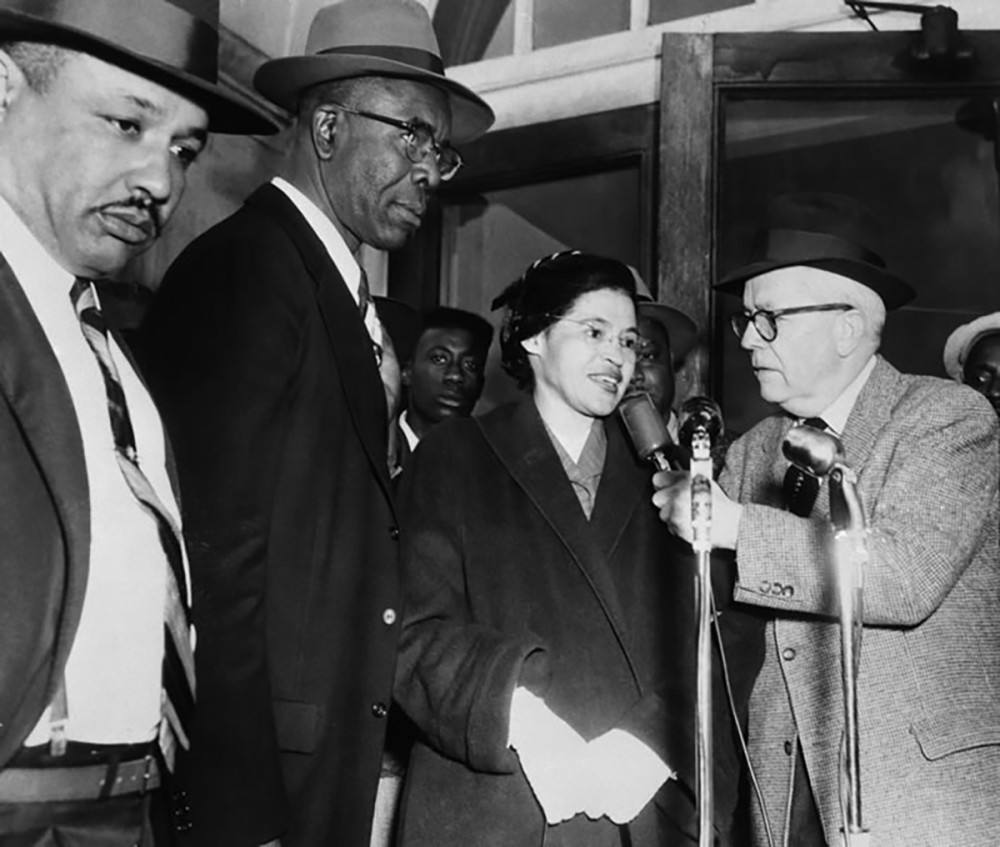
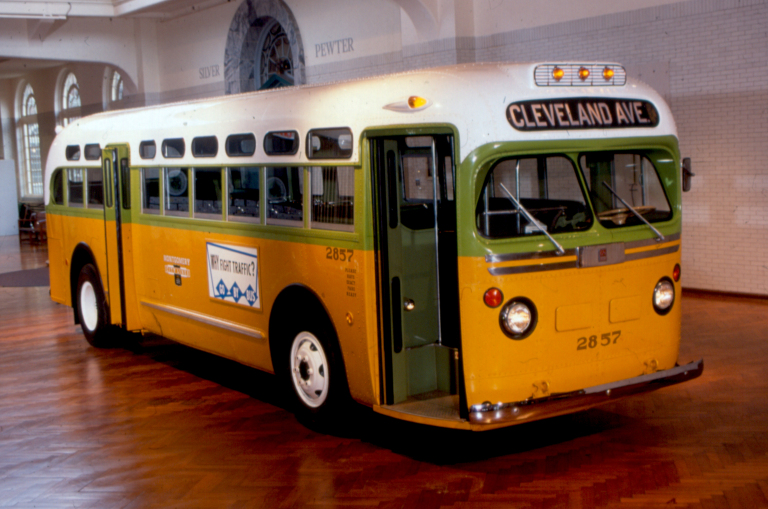



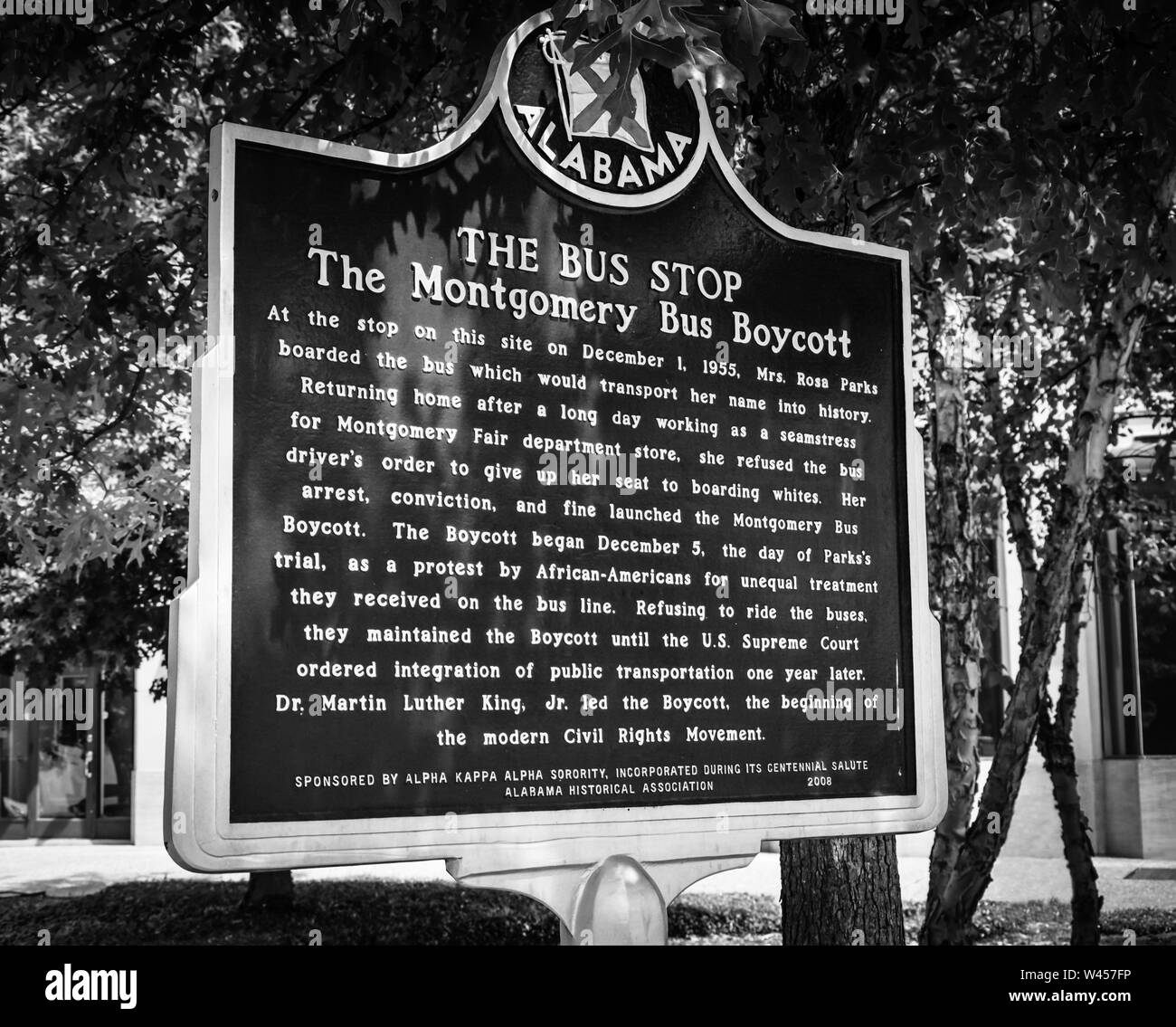
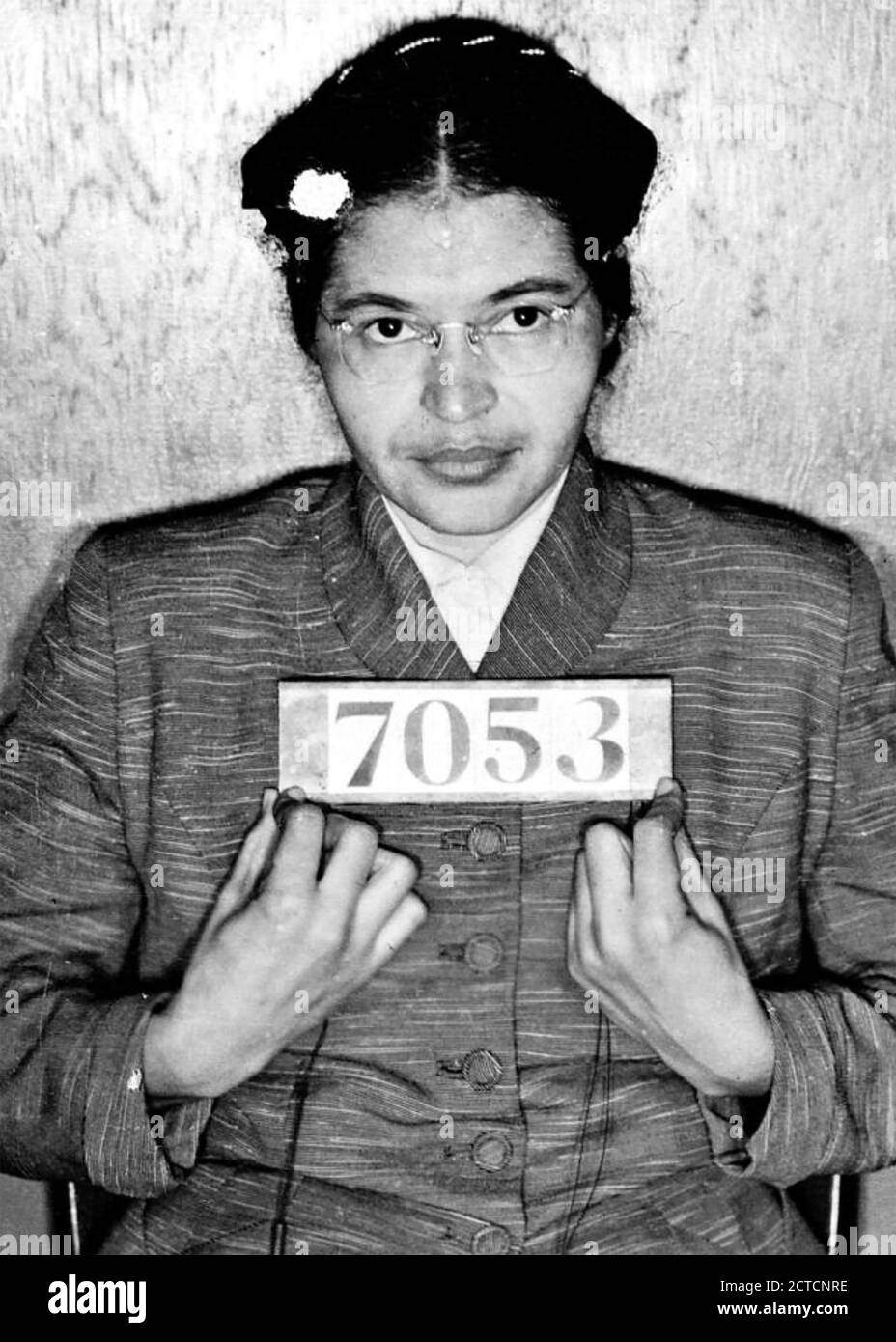

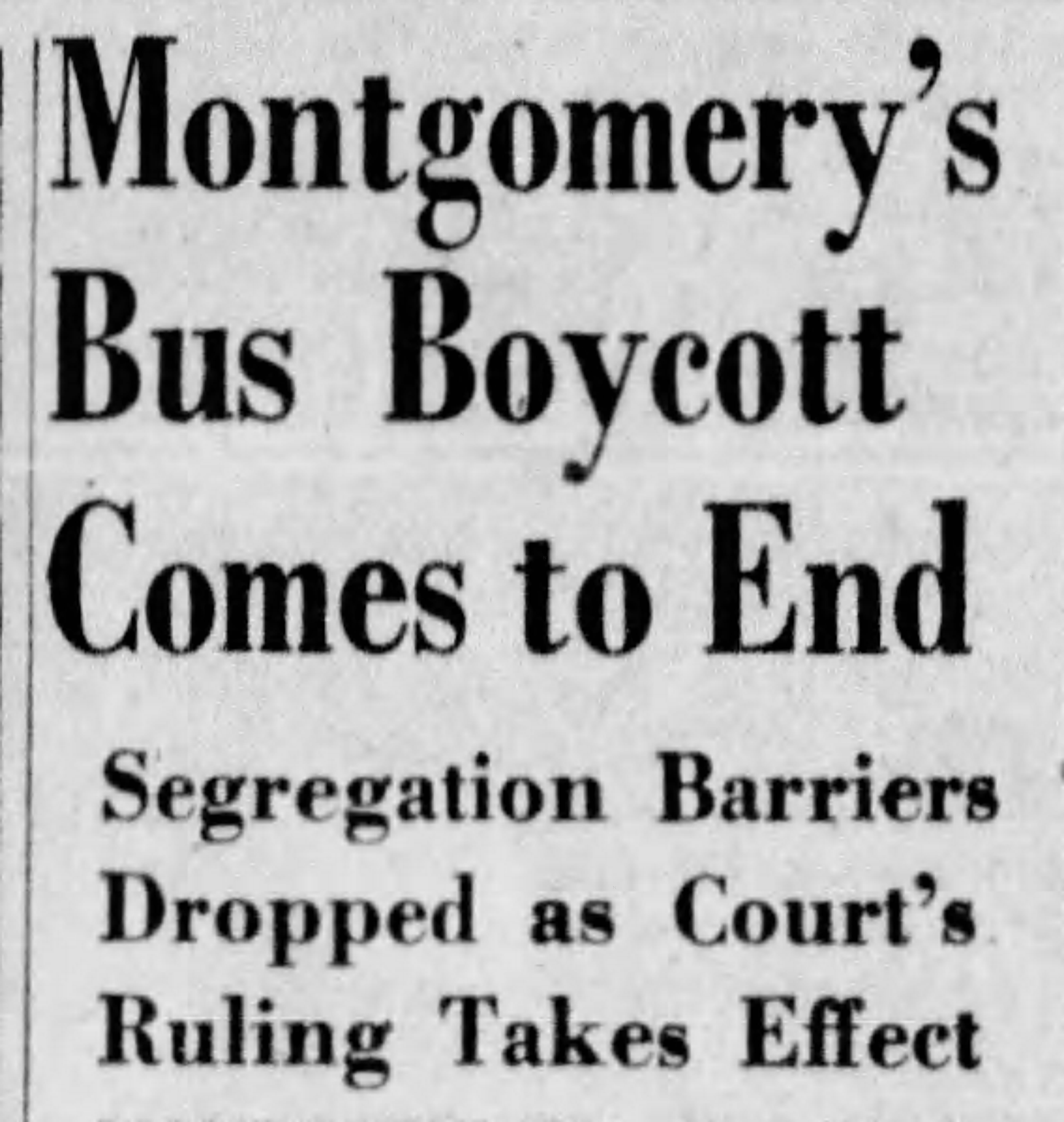
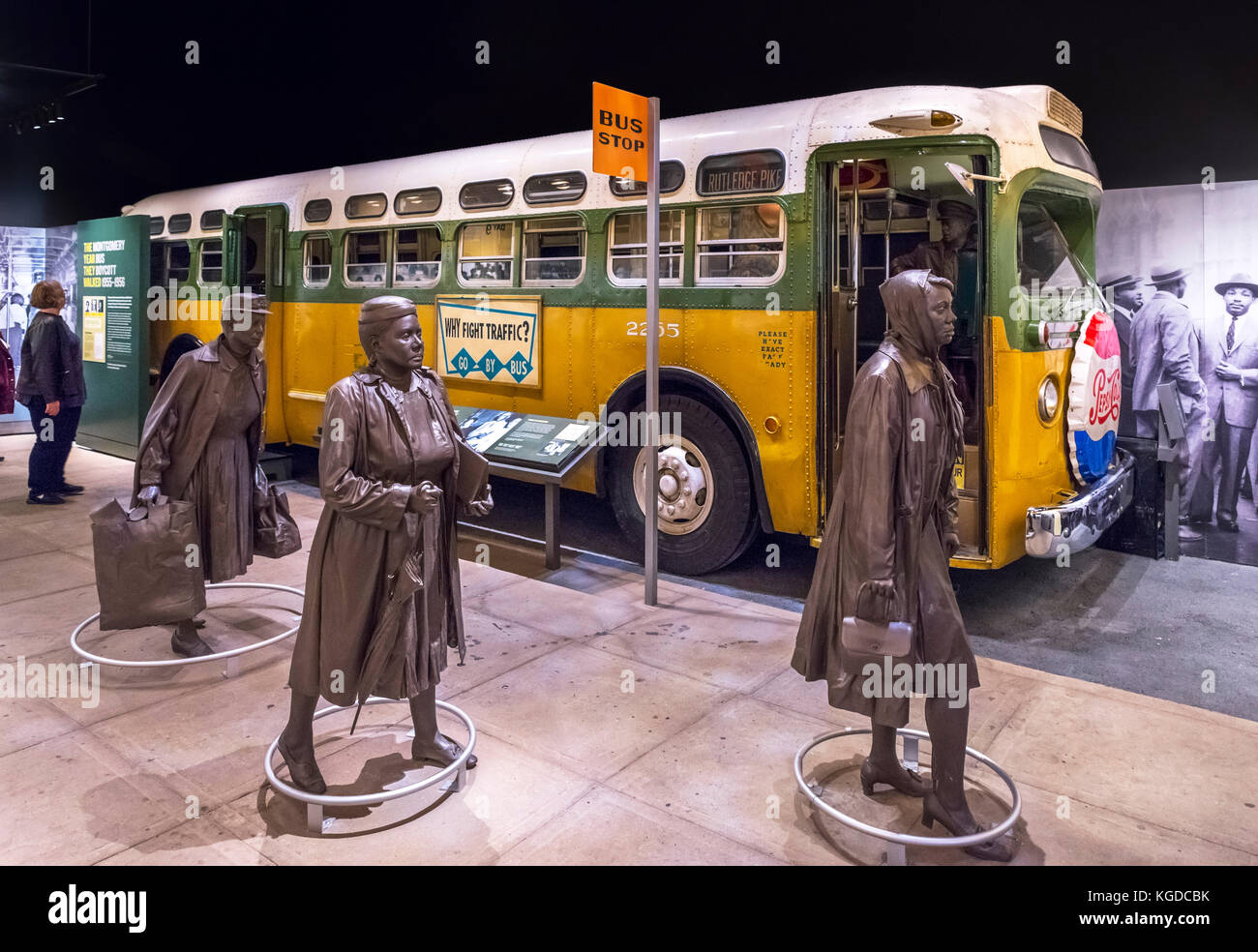


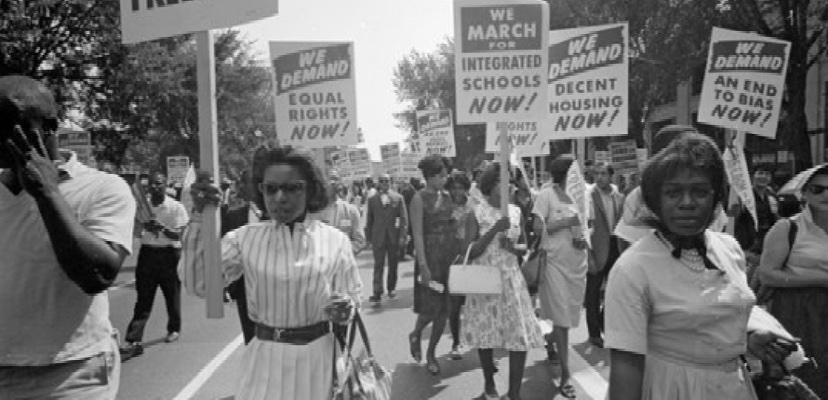
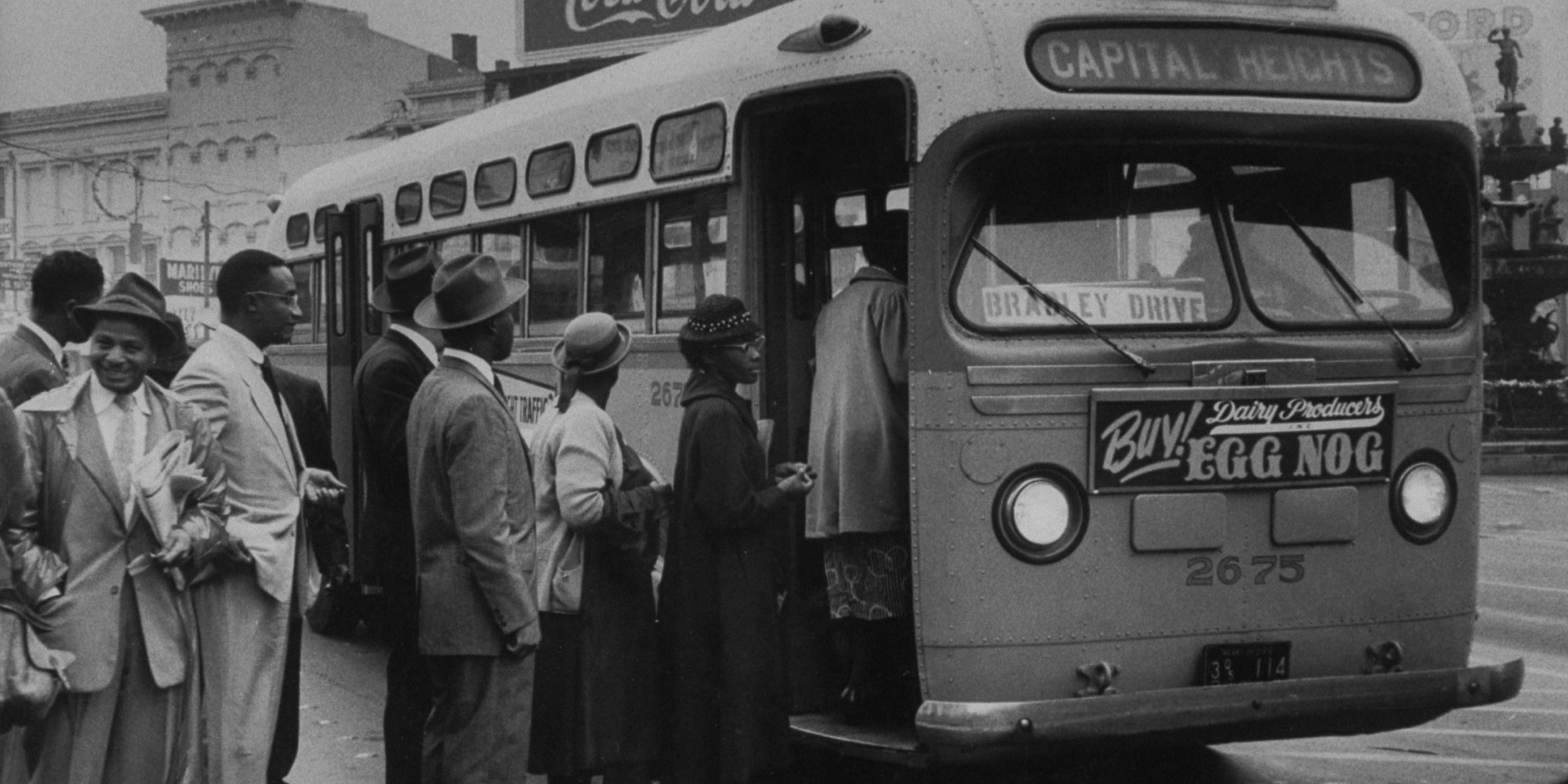


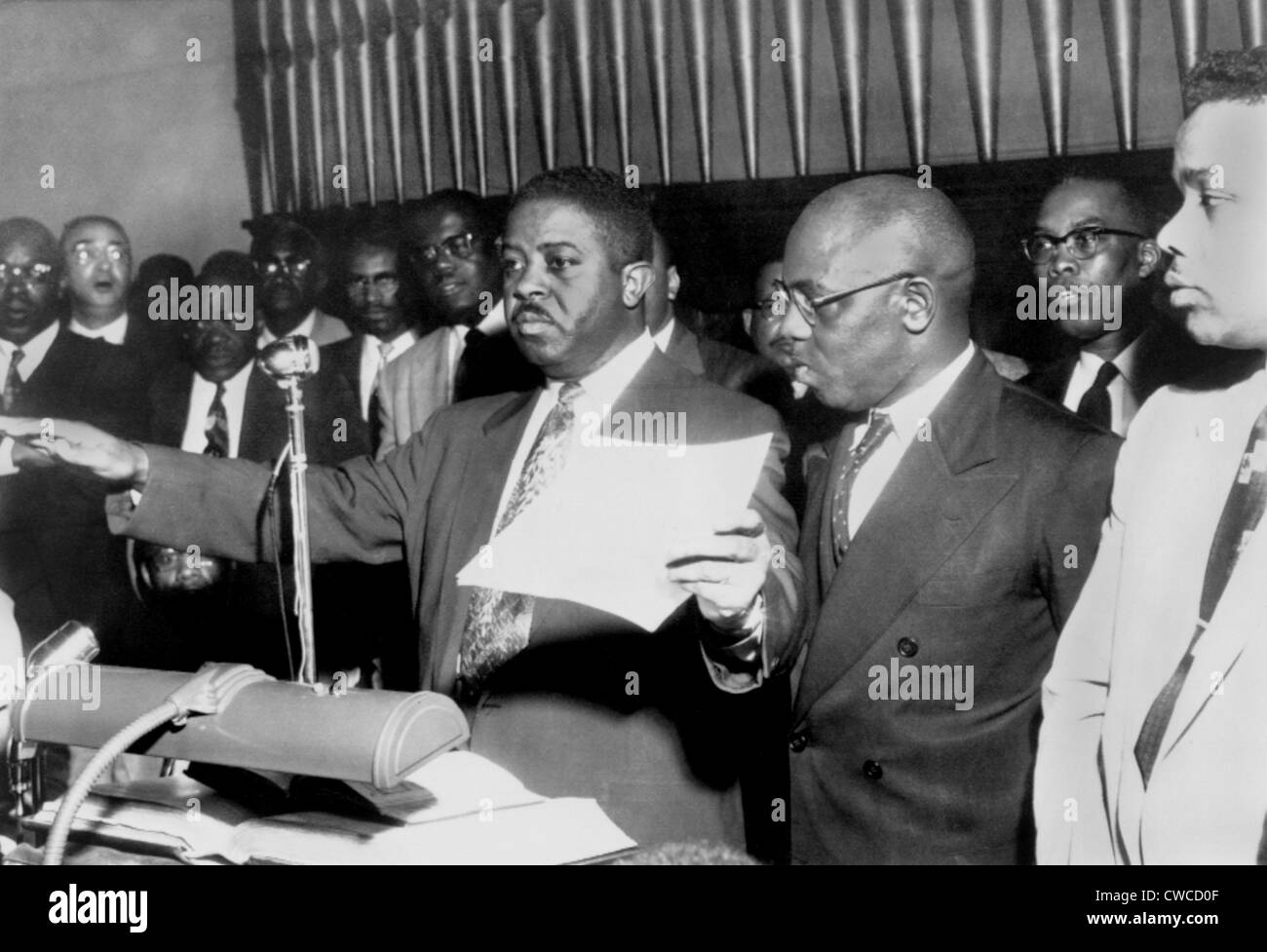


/MontgomeryBusBoycott-56a48e2b3df78cf77282f150.jpg)

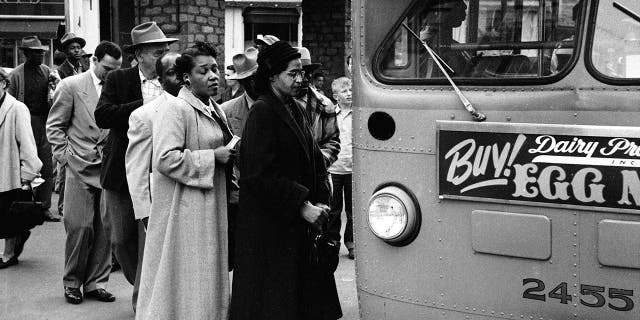


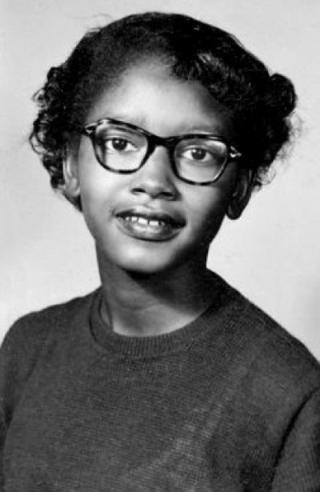










0 Response to "40 montgomery bus boycott"
Post a Comment